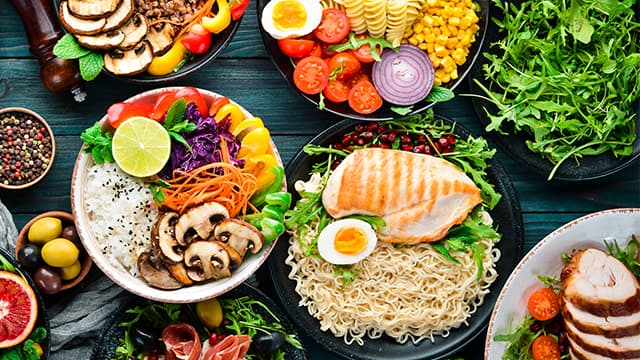Imagine opening a wicker basket filled with crunchy mixed nuts, sharp cheeses and tangy citrus fruits. No, it's not a delightfully healthy picnic spread. It's actually everyday food items that can help whiten your teeth. Here's some more food for thought — the food you gobble up affects your teeth whiteness. It's true. You could go down the oral health aisle and grab a teeth whitener off the shelf. Or you can update your grocery list by adding (and scratching off) foods that make your teeth white and you happy. Chances are, most of the items are already in your fridge or cupboard. Give the below a taste to see for sure.

How to Get Whiter Teeth With the Right Foods
1) Avoiding certain foods
First things first — prevention. This means before you start adding to your diet, you should be eliminating some food and drink stain-causing culprits. By keeping them a part of your routine and menu, you're allowing them to slowly discolour your teeth over time.
To stop your teeth from staining, try eliminating:
- Coffee and tea
- Red wine
- Berries
- Pasta sauce
- Curries
2) Tart foods
You may not know it, but the saliva in your mouth is your own personal teeth whitener. It naturally washes away food debris that can stain your teeth. Try tart foods like:
- Grapefruit
- Lemons
- Limes
- Oranges
- Green apples
They can put your saliva production into overdrive to help keep those teeth squeaky clean.
3) Dairy products
Some say, 'cheese makes everything better'. Well, they may not be wrong. The benefits of cheese and yoghurt are plentiful and, of course, flavourful. Dairy has the ability to:
- Strengthen teeth and bones with calcium
- Decrease tooth decay and staining by increasing the pH level in your mouth
- Overpower the harmful bacteria with the good probiotic bacteria found in yoghurt
- Assist in scrubbing away food and stains with hard cheeses like parmesan, romano and gouda
4) Crunchy foods
Again, the more that can help produce saliva and protect your teeth against decay, the better. Enter — crunchy foods. So, think:
- Apples, again
- Celery
- Carrots
- Nuts
All of them help assist in your saliva-making ability. And these crunchy items are somewhat abrasive on your teeth, aiding in scrubbing down those surface stains.
5) Pineapple
According to a study published in Clinical Oral Investigations, bromelain, an abundant enzyme found in pineapple, aids in removing surface stains and plaque. It's also been known to decrease inflammation from sore gums. Now there's food to pine for.
Sure, you can opt for an over-the-counter teeth whitener. And it'll help. But proper oral hygiene combined with these simple diet and menu tweaks will make that bright smile of yours really pop. Just remember — keep the red wine corked and pop open sparkling drinks on your picnic instead.
Should You Brush Your Teeth Before or After Eating?
Now you know how to naturally whiten teeth with teeth-whitening foods, the next thing that’s good to know is WHEN you should brush your teeth. You might not realise, but this can also have an effect on your oral health! Some people prefer to brush their teeth as soon as they wake up, while others would rather eat breakfast in the morning and then brush. Brushing your teeth with a fluoride toothpaste before eating breakfast will get rid of any plaque bacteria that’s built up in your mouth overnight and also give your mouth protection before you eat. Brushing when you get up can also kickstart your saliva production for the day, which naturally helps to cleanse your teeth.
If you prefer to brush your teeth after breakfast, it’s a good idea to wait for at least 30 mins after eating. Breakfast foods like toast, pastries and orange juice can be acidic, and brushing straight after eating these things can be harmful to your tooth enamel – keep this in mind any time you brush your teeth after eating! To freshen your mouth post-breakfast, you can chew sugar-free chewing gum and try to drink plenty of water. Of course, you should also brush your teeth in the evening before bed to remove any bacteria and food particles before you go to bed. [kw1] Then you can enjoy a good night’s sleep knowing your teeth are clean and your mouth is healthy!
This article is intended to promote understanding of and knowledge about general oral health topics. It is not intended to be a substitute for professional advice, diagnosis or treatment. Always seek the advice of your dentist or other qualified healthcare provider with any questions you may have regarding a medical condition or treatment.








